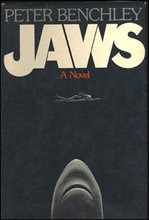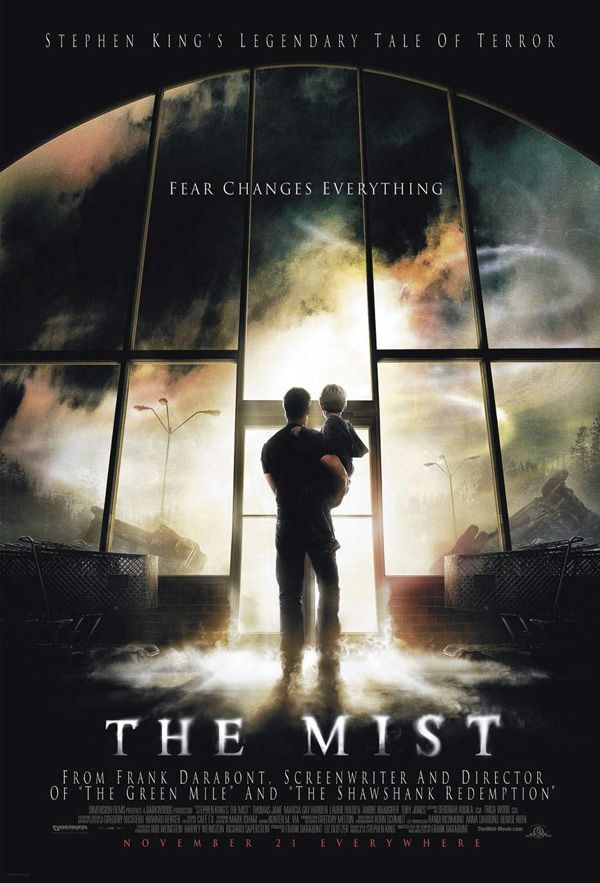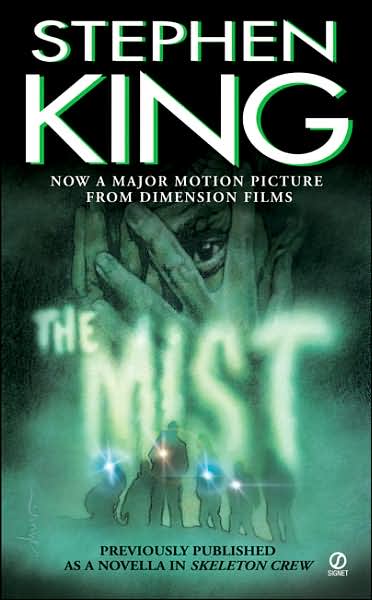In keeping with the more literary nature of this esteemed blog, I wrote a previous post on a good selection of favourite horror novels to keep you spooked until the morning light. This year, I thought I'd broaden that idea. Let's face it, when it comes to horror, most of us will rent a movie or two. But let's keep it somewhat in the same vein, and focus on works of fiction adapted to film.
These are a few of my preferred choices for a night of literary horror, the ones I find myself returning to on evenings when there's nothing on, and nothing to do but crack open a beer and relive some basic terrors. Some adhere quite closely to their source material, and some veer wildly away. These are inherently personal choices, and while many have both detractors and enthusiasts, they cannot be defended by anyone here but myself. You don't like? Go rent something else. I'm sure your local public library has a copy of The Pacifier waiting just for you (the horror!).
And for those wondering why the venerable Dracula and Frankenstein have been left off this list:
1) Frankenstein is a great, great film, and its importance cannot be underestimated. But Bride of Frankenstein is even better, but cannot really be considered an adaptation and is thus ineligible for this list; and
2) Dracula (the Bela Lugosi version) is a boring mess. Sad, but true. It's also a defiantly dull novel, vastly overpraised. Other filmic adaptations, while infinitely preferred by moi, are not movies I return to on a regular basis.
Invasion of The Body Snatchers


written by Jack Finney [as The Body Snatchers]
directed by Don Siegel [as Invasion of the Body Snatchers] (1956), Philip Kaufman [as Invasion of the Body Snatchers] (1978), Abel Ferrara [as Body Snatchers] (1993)
Admittedly, the second manifestation of Finney's work is my personal fave, but all three are worth your time, even the unjustly ignored third (but avoid the Nicole Kidman version at all costs). Each carves its terror from that block of paranoia lodged within our subconscious, that fear that our loved ones are not who they say they are. It's also the loss of identity that drives the terror, the fear that we are but a breath away from becoming that which we hate. The first movie became viewed as a warning against the scourge of communism, the second used new-age mysticism as its base, and the third railed against the conformity of self present in our military apparatus. Each has scares aplenty, but only one has the awesomeness of Donald Sutherland, thus earning its edge over the other two. And when you add in the greatest whopper of an ending ever, you get gold, baby!
Jaws


written by Peter Benchley
directed by Steven Spielberg
Spielberg has gone to many other films, some of which are legitimate classics. None, however, have played with dread and fear so effectively Jaws, as his first major film. It's a cliche to say that the movie changed Hollywood, but there you have it. It also demonized sharks beyond all rational thought, which is a testament to Spielberg's skill (as well as a condemnation of the mob mentality of humanity).
Jaws is one of those films that grabs you from the throat from the opening strains of its thumping tuba melody and doesn't let go until Brody and Hooper face off against the beast. Spielberg is still a force, but doubts exist as to whether he could still manage to evoke the fundamental terror of his monster from the depths. That first appearance of the shark, just under the surface of the water, pulling that boater under...still hate deep water.
The Fly

written by George Langelaan (short story)
directed by Kurt Neumann (1958), David Cronenberg (1986)
I love both Flies. The first is a brightly-colored nightmare, the second as gory and wet a movie as you could ever hope for. Cronenberg's version is by far the more complete film, being an epic love story as well as a goreathon of the highest calibre. Very rarely have I wanted to cry at the death of a practical special effect, but damned if this one did not get to me. And the original is a ton of fun, and has its moments of sadness as the mad scientist silently pleads with his wife to end his torment. While I'll give the higher praise to Cronenberg (and a career-high performance from Jeff Goldblum), the first will always hold a special place in my heart, if only for "Help meeee! Help meeeeee!"
Hellraiser


written by Clive Barker [as The Hellbound Heart]
directed by Clive Barker
The only movie on this list directed by the original author. The lowest budget of them all (adjusting for inflation). The goriest. The most squirm-inducing and unpleasant to sit through (in the best definition of the phrase). You can quibble with the results, but its undeniable that Clive Barker created something inherently unique, a family drama involving violence, lust, and S&M bondage gear mixed with religious iconography. Wild, wild stuff. And of all the monsters on this list, the lead cenobite Pinhead is the most iconic, even if he devolved into a sideshow barker over the course of countless unnecessary sequels.
The Thing

written by John W. Campbell [as Who Goes There?]
directed by Christian Nyby [as The Thing from Another World] (1951), John Carpenter (1982)
How could I not include The Thing, a seminal work of movie horror in both its iterations? Both are hugely influential, but the edge will always go to the John Carpenter version, if only because it hews far more closely to the original source material. Also, it's fabulously gross. I mean, the head grows legs and walks away! You gotta be fu@#in' kidding!
Both versions are tight little nightmares involving trapped individuals, but Carpenter's version adds a grim layer of paranoia (very similar to that of the Body Snatcher variations) by having a monster that replicates itself into any organic life form it comes in contact with. Who's human? Even the actors weren't sure, if the DVD commentary is to be believed (and yes, I listen to commentaries, I've that much of a geek).
The Mist


written by Stephen King
directed by Frank Darabont
I could make a legitimate claim for many films based on Stephen King novels being on this list. The Shining? Awesome. Carrie? Whoo, baby. Children of the Corn? Well, as a date movie, maybe...
But The Mist may be as perfect a rendition of King's work as anyone could hope to get. Director Darabont - no slouch with King's work, having directed adaptations of King's The Shawshank Redemption and The Green Mile to Oscar nominations - takes his usual penchant for hopeful endings and does a complete 180, resulting in a gloomy little horror epic that is as demanding as they come.
Both works take a cue from such claustrophobic moves such as Night of the Living Dead, confining its characters in an enclosed space and assaulting them with all manner of wee beasties. In this instance, it's a supermarket shrouded in a thick fog in which all manner of devilish monsters await anyone stupid enough to venture out. The monsters are handled well (especially considering the budget limitations), and the attacks are suitably horrific and gruesome.
However, the real monsters are inside, as the movie subtly turns into a study on group dynamics. Cut off from the outside world, the terrified humans fall prey to the histrionic rantings of a devout Christian fundamentalist. "As a species we're fundamentally insane," Ollie the grocer opines. "Put more than two of us in a room, we pick sides and start dreaming up reasons to kill one another. Why do you think we invented politics and religion?" In this way, The Mist adds an element lacking from Carpenter's The Thing, the only mainstream horror film I can can compare this to. The men of the arctic post may have fought ramping paranoia, but they'd have had no problems in shutting down a religious nutjob with a swift blow to the head.
As the scares ramp up, the mob becomes bloodthirsty, and all notions of civilization fall by the wayside in a very short period of time. All of which combine to end the film in one of the bravest and most downbeat endings to a horror film in quite some time, even more than The Thing. Some people hate the ending, but I think it's absolutely perfect. Those looking for a feel-good horror epic need look elsewhere.
Lifeforce


written by Colin Wilson [as The Space Vampires]
directed by Tobe Hooper (1985)
Ah, the mid-nineteen-eighties. It was a simpler time. A time when a director such as Tobe Hooper could command huge budgets for personal projects. A time when Steve Railsback was considered a leading man. An innocent time.
I can't really defend this choice, other than it's one of my all-time guilty pleasures, a bizarre fun-fest of conflicting ideas and money run amok that never fails to entertain me. Wilson's novel is a fairly straightforward and (despite the gloriously pulpy cover to the right) sedate affair, setting a far more cerebral tone than its cinematic counterpart. The Space Vampires concerns, uh, let me check my notes...ah, yes, vampires from space. Wilson follows a group of scientists as they study and hunt down a strange being who may be the progenitor for the vampire myths of old. It's a studied affair, measured and direct, and hardly a sensational, hyperbolic affair.
Not so the adaptation. Tobe Hooper was on a career high, after arguably directing the hit horror flick Poltergeist. Given an immense sum of money, I think Hooper went a little bit nutso, the end result being a fantastically weird horror/sci-fi epic firmly in the vein of the Quatermass films of the 1960s (and you should check them out, they are awesome). It starts out as a space epic, as a British/American team of astronauts are sent to check out Haley's comet. There, they find a bizarre Lovecraftian type of spaceship filled with dessicated bat-creatures and three humanoid life-forms. Returning to earth, the lead female escapes and begins infecting the populace, and the movie switches gears into a weird psycho-sexual drama as lead astronaut Railsback finds he has a psychic connection with her. Then, in another left-turn, the movie becomes a zombie film as newly-infected persons quickly turn London into a battle zone. All this, plus fantastically inventive practical effects work and a jaunty, bombastic score by Henry Mancini.
It is a weird, weird, weird film, and although I know that none of it should work, it has always fascinated me. There is a certain amount of astonishment that something so unhinged was ever allowed to go through a major film studio (even if it was only Cannon). I return to it again and again, reveling in the great atmosphere, the ridiculous scientific explanations, the overacting Railsback, Patrick Stewart (!), and everything else. It is wonderful, absurd, inane, and perfect.
By the way, the trailer below is red-band for partial nudity. You have been warned.
You know, as I look over this list, I realize that I really have a thing for the downbeat ending, don't I? Not much hope on this list. But that's where the true scares are found, don't you think? Not from the "boo!" but from the slow realization that the monsters are real, and they will always, always win.

No comments:
Post a Comment